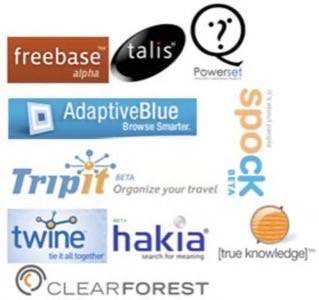Here is a summary of the week’s Web Tech action on Read/WriteWeb. For those of you reading this via our website, note that you can subscribe to the Weekly Wrapups, either via the special RSS feed or by email.
Web News
This week continued the recent theme of Google and Facebook dominating the news. Google did an experiment with digg-style voting, which predictably excited the tech blogosphere. However Marshall Kirkpatrick warned people to “keep your pants on”, because there is no sign the voting will go live on Google’s search. Also this week Google Reader launched a recommendations feature, in which it now recommends additional feeds to users based on their subscription lists, web browsing history and “more.” Marshall was relatively impressed with it, saying that “simple recommendation is the low hanging fruit of data mining.” He did note though that it appeared to be limited to 20 recommendations, so there is much room for improvement.
In this week’s Facebook news, the social network company made changes to Beacon – the new advertising system in which some of your retail data is made available to other Facebook users. Josh Catone wrote that despite the changes, privacy issues still loom. According to Facebook, participation in Beacon, while still controlled site-to-site, is now explicitly opt-in — ignoring a Beacon notification will no longer be taken as passive acceptance to publish stories to your news feed. Users will have to explicitly tell the system they are okay with the information being passed to their profile before any info is posted.
In other news this week:
- Web Word Processing Goes Offline With Zoho on Gears
- MySpace To Make Run at Professional Networking Crowd?
- Fox Interactive Media Plans Ad Network Expansion
- Intuit Finally Buys Homestead for $170m
- ‘It’s the Network’ – Verizon Wireless to Open Up
- Brightcove Gives Up on Consumer Video
- The Internet Gets a Stock Index, but No Microsoft, News Corp?
- Yahoo! To Take Web Widgets to the Desktop
- Amazon to Give Away 1 Billion Free MP3s in Superbowl Promotion
Web Products
10 Semantic Apps to Watch (see also Semantic Technology In Action: An Interview with Dr. Paul Miller)

One of the highlights of October’s Web 2.0 Summit in San Francisco was the emergence of ‘Semantic Apps’ as a force. This week we highlighted 10 Semantic Apps. Many are still non-public apps, e.g. in private beta. It reflects the nascent status of this sector, even though people like Danny Hillis and Nova Spivack have been working on their apps for years now.
Afrigator: The Best of African Social Media, in Real Time
African social media aggregator Afrigator held a launch party in Johannesburg this week and unveiled the beta of the team’s beautiful new website. Several thousand African blogs, podcasts and videos are already indexed and viewable.

The site offers services for both readers and content producers. Visitors to the site can sift through content by keyword, country, time, hot items or hot sources.
Ask500People: Polling The Web In Real Time
Recently launched Ask500People is an interesting new polling experiment that endeavors to ask questions of 500 people around the world and report the results in real-time. Ask500People is not a polling widget that you can use to run questions on your site (though they have formed partnerships with some high traffic sites to occasionally run polls), but rather it is a way for people to gain access to a large crowd to ask pressing questions.

Analysis
The Troubles With OpenID 2.0 (see also User Centric Identity: A Call To Action and Blogger Beta Ships OpenID)
This week we investigated the state of OpenID. Portland, Oregon’s JanRain, leaders in the OpenID movement, put on a PR push this week to promote what they say is the imminent approval of OpenID 2.0’s final draft. Specifically, they say that they expect the final signatures to be penned on Monday at the upcoming Internet Identity Workshop.

General consensus is that it’s the finalization of 2.0 that many big players have been waiting on. Remember when Digg said they would support OpenID, for example? In theory, this is what they and many others are waiting on. But there are issues to resolve…
There’s No Money In The Long Tail of the Blogosphere (see also The Economics of Blogging for Attention)
In 2004 Chris Anderson wrote an influential book called The Long Tail. In it,
he argued that the future of business is to sell less of more. The main premise is that collectively, things that are in
rather low demand can amount to quite large volumes. This is because there is a large number of people who belong to the long tail and they encompass a wide rage of tastes.
In a recent post here, we examined the reasons that people feel compelled to blog. From the post and the comments it received, it became clear that quite a few people
are blogging to make money. The blogs that they started live in the long tail of the blogosphere, however, and the reality
is that it is difficult to make money in the long tail – Anderson’s point was that the money is to be made by selling to the long tail, not so much by existing in it.
In this post we examine why that is and look at other aspects of long tail economics.

A Big List of Sites That Teach You How To Do Stuff
With all due respect to Kevin Smith, the web is no longer only for complaining about movies. In fact, there are a large number of very helpful sites that teach you how to do things. These are do-it-yourself sites, but we’re not talking about building a deck or baking a cake — the web is full of more general interest sites that give quality instruction on all sorts of fun and useful projects. Including, sometimes, how to build a deck or bake a cake.
In this horribly-titled, but hopefully useful round-up we will specifically focus on such general purpose sites that include some sort of rich media instruction (generally video). We also threw in a tech-focused site or two, since this is after all, a tech-focused blog.
GDrive: Three Ways it Could be a Game Changer
The Wall St. Journal ran a B1 story this week about the forthcoming online storage service from Google. Call it GDrive, call it Platypus, call it My Stuff – the vast majority of tech bloggers have called it old news. Marshall disagreed. He thinks there’s a lot of potential for Google’s online storage to be a game changing product.

It appears that the GDrive will sit on your desktop and sync automatically selected files automatically with online storage. Those files will be accessible from the desktop and browser at least as easily as they would be were they on your own hard drive.
R/WW Network Blogs
last100
Check out a wrap of the week’s Digital Lifestyle news on last100. Verizon, the number two U.S. carrier, received a pat on the back from many in the tech blogosphere by announcing that they are opening up their network to any phone and any software application, meaning that consumers will have more choice over the devices and software they use on Verizon’s mobile network. However, last100’s Dan Langendorf was less than impressed, saying the move “is nothing more than Verizon counter-punching in a high-stakes heavyweight bout between the carriers, Google, the government, and consumers.”

As if to add weight to Dan’s cynicism towards Verizon, Google officially confirmed it will be bidding in the upcoming mobile spectrum auction . But how intent is the company on winning?
In Internet TV-related news this week, the three major British terrestrial TV networks – the BBC, ITV and Channel 4 – have announced an initiative, known as “Kangaroo”, to develop a combined service for accessing their on-demand and catch-up services.
Alt Search Engines
This week on AltSearchEngines, the theme was “Innovation.” KartOO launched it’s new KartOO Visu, Lycos showed off their image search engine “lyGO”, Exalead launched a new iPhone version i.exalead.com, PeekYou announced their new Google search!, and Omgili came out with their new Product Reviews.

Next week on ASE, Charles will announce the Search Engine of the Year and then AltSearchEngines goes to SES Chicago!
Read/WriteTalk
This week Sean Ammirati of Read/WriteTalk interviewed Chris Shipley. She is probably best known as the executive producer of the DEMO conference. In this episode, Chris discussed both her predictions for where the web is heading and also specifically what she would do if she were a venture capitalist or entrepreneur. She finished the interview by sharing some of the common attributes observed across entrepreneurs who have gone on to be successful.

Poll
This week’s poll asked: Do you use the Mobile Web? The results:
Yes, I use the Mobile Web daily 37% (176 votes)
Yes I use it; less than daily but at least once a week 18% (87 votes)
Yes, but only every 2-4 weeks 5% (23 votes)
Very rarely 11% (51 votes)
No, I don’t use the Mobile Web 28% (134 votes)
So a small majority of RWW readers are currently using the Mobile Web, but about 2/5 still don’t or rarely use it.
That’s a wrap for another week! Enjoy your weekend everyone.










